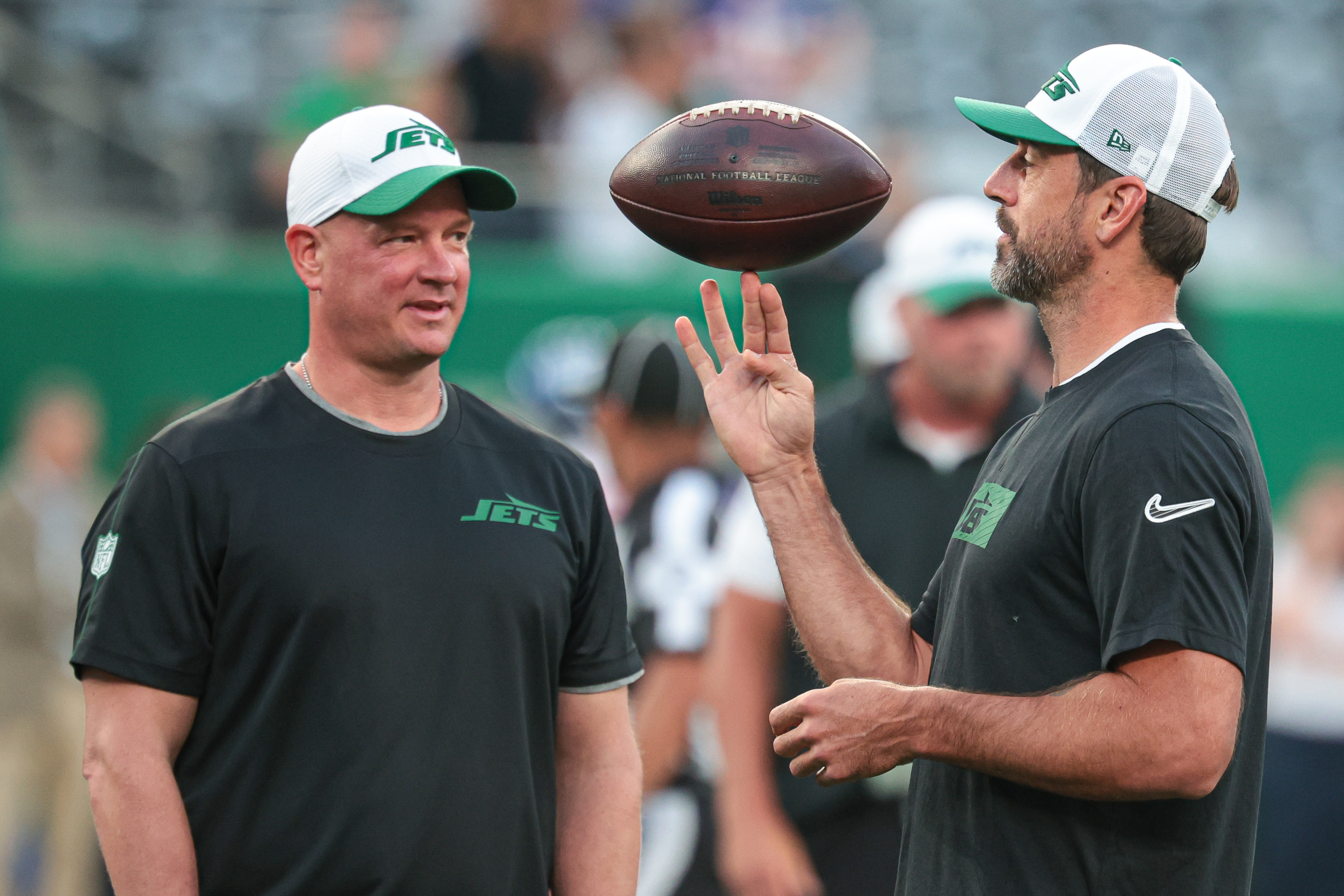Run, run, pass. For far too long this has been the New York Jets offensive strategy. This has been the case with this team for decades. Across coaching staffs, under various offensive coordinators, and with wholly different rosters.
I remember watching the team as a kid as they ran their offense through Curtis Martin. The Hall of Famer averaged 320 carries per season over 8 campaigns in green and white. In 2023, the NFL’s rushing attempts leader was Derrick Henry with 280. That same season only seven backs, including Henry, logged more than 250 carries.
I remember the “Ground and Pound” years under Rex Ryan. During the back-to-back AFC Championship run in 2009 and 2010, the Jets ranked 20th and 11th respectively in total yardage. They ranked 17th and 13th overall in scoring offense those two years.
We’ll skip past the Todd Bowles and Adam Gase eras, but running the football was the crux of their offensive game plans as well, despite the passing game evolution that occurred throughout the 2010s and continues to boom during this decade.
“Establish the run”
“Establish the run,” is a common cliche you hear from color commentators during an NFL game. The conventional wisdom is that in order to establish the run and in turn control the time of possession, you need to run early and often to make the defense respect the ground game.
The logical fallacy here is that, unless the talent discrepancy between two opposing teams is incredibly significant, this predictability does the opposite of what teams with strong running games want to accomplish, which is to oppose their will on their opponent.
More conventional wisdom suggests using the run to set up the pass, and the mechanism to do that is via the play-action pass. However, research has shown that neither rushing success nor rushing frequency has much bearing on play-action pass success. Instead, the biggest determining factor is quarterback ability.
For the Jets, since Chad Pennington left town competent QB play has been something hard to come by. However, with a future Hall of Fame quarterback in Aaron Rodgers who despite his season debut’s warts was still ProFootball Focus’s fifth-ranked QB in week one that is no longer the case.
Given all of this, and how rule changes have made passing the preferable mode of offense since Curtis Martin’s heyday, it makes sense to use the passing game to establish the run rather than follow the conventional wisdom.
Breece Hall is still the Jets’ most explosive offensive player
When it comes to game-breaking home run hitters, Breece Hall isn’t just the best option on the roster, he’s one of the best in the league. Consider the fact that he finished fourth in the league last season with 1,585 total scrimmage yards despite playing with league-worst QB play, playing behind a completely broken offensive line, and starting the season less than a year removed from a devasting ACL injury and that feat is even more impressive.
A big reason for Hall’s insane production last season was his receiving prowess. He led all NFL running backs in receptions with 76 and receiving yards with 591. The Jets didn’t necessarily shy away from utilizing him in the passing game against San Francisco as he finished the game with five catches on six targets, but they did not always utilize him in the most creative ways as a receiver.
Just because Hall is the best chance at generating instant offense doesn’t mean he should be force-fed the ball efficiency be damned. Instead, it makes sense to maximize his talents by generating some sort of element of surprise on occasion when he touches the ball.
- Jets have a major problem brewing with star wide receiver
- Jets’ ownership reportedly vetoed trade for star wide receiver due to Madden video game ratings
- Unheralded Jets free-agent signing has quietly become one of the team’s best players in 2025
Nathaniel Hackett needs to be more creative
Jets’ offensive coordinator Nathaniel Hackett has received his fair share of criticism over the years. After flopping as the Denver Broncos head coach after only one season, Hackett was the subject of much criticism after an abysmal 2023 showing. That criticism continued after the team’s week one performance as his lack of creativity was largely responsible for the run, run, pass, punt offensive strategy.
Unlike the 2009-2010 Jets, or even Jets teams of recent years, the coaching staff needs to accept that they might not field a dominant defense this season to prop up the offense. Without star pass rusher Haason Reddick, and with the departures of defensive line stalwarts John Franklin-Myers and Bryce Huff the dominant defensive line that has been so crucial to the defense’s success may be no more.
To that end, the offense will need to pick up the slack to get the Jets where they want to go this season. That means Hackett needs to pull his weight. It’s unacceptable that promising rookie running back Braelon Allen, who excels in areas that are Hall’s weakness, didn’t get a carry until garbage time in the fourth quarter.
A smart play would be to get Hall and Allen on the field at the same time to create some confusion amongst defenses. Passing the ball on first down, to then set up the run on second and short, would be another move to keep defenses off balance. Letting Aaron Rodgers take more shots downfield is another.
Whatever he chooses to do, the run-run-pass play calling cannot continue.
